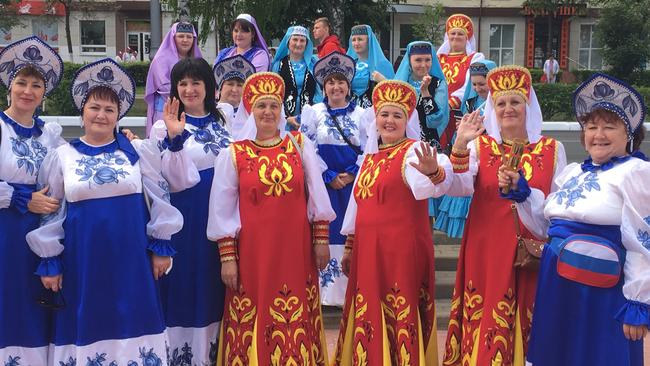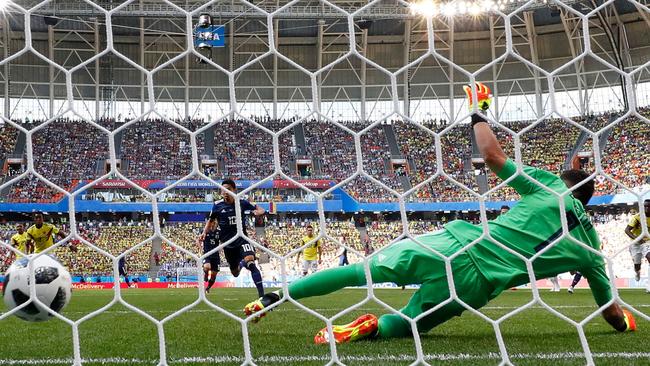The World Cup has brought out a new side of Russia
OVER a million soccer fans from around the world have descended on Russia for the 2018 World Cup. And it’s defied all my expectations, writes Michael McGuire.

Rendezview
Don't miss out on the headlines from Rendezview. Followed categories will be added to My News.
KANGAROO.
It’s an international word. More so than even the name of our country it seems.
Saturday morning in Saransk. It’s a city of 300,000 people around 650km east of Moscow. It’s a lovely town. Wide streets and lots of greenery, some impressive architecture as well. It’s a relatively small place, so I decided to walk to the Mordovia Stadium where the Peru versus Denmark World Cup game was to be played.
Saransk is alive with people. Many are dressed in Russian national costume. Men and women. Young and old. Some are dancing, some are singing, some playing the accordion. There is a feeling of happiness in the air. A celebration of the World Cup and being Russian.
An older woman in a traditional outfit stops me, clearly recognising I’m not from around these parts. Possibly the World Cup accreditation lanyard hanging from around the neck gives me away.
She starts speaking to me in, obviously, Russian. I do the blank stare I have perfected over the last week and produce the smile that suggests I may be an idiot. We both laugh. My Russian is as good as her English. She points at the lanyard. I think she is asking where I am from.
I try to say Australian in Russian. It’s something like “Avstraliya”. Not that complicated really. But clearly the women has no idea what I’m saying. Maybe I’m just saying Australia in the normal way but with a Russian accent stolen from a Bond film.

Another thought occurs. How do you describe Australia in one word? And a word that leaps the language barrier. I stick with the bad Russian accent and say “kangaroooo”, extending the last syllable because I think it sounds more Russian that way. And just for good measure I do my best Skippy impersonation, curl my hands into paws, hold them in front of my chest and do a little hop. Immediately, she understands.
With joy she repeats “kangarooooo, kangarooo’’. And does her own little Skippy impersonation. Then she points at me and says “Avstraliya’’, which I could swear is exactly what I said to her before the whole kangaroo business started and pulls me into a group photo with her mates. She tells them all “kangaroooo, kangaroooo, Avstraliya’’.
We part as great friends after a couple of pics and they all wave and shout “kangaroooo”. These women were all in their 60s and 70s. The changes to their country over their lifetimes has been rapid. Josef Stalin would still have been in charge when some of them were kids. They lived through the Cold War, Nikita Kruschev and Leonid Breshnev. They saw the end of Communism and the gradual opening up of Russia starting under Mikhail Gorbachev.
It’s been almost 30 years since the Soviet Union formally ended and there is still a sense that Russia, while trying to catch up, is still caught between two worlds.
Perhaps that’s just a western interpretation but there are still many statues of Soviet Union founder Lenin around. In Saransk street names include Prospect Lenina, Kommunisticheskaya Ulitsa, Proletarskaya Ulitsa and Sovetskaya Ulitsa.
Russian president Vladimir Putin in his speech at the World Cup opening ceremony said visitors to the country should “enjoy their stay in Russia, an open, hospitable and friendly country, and meet new friends — people with whom they share the same values.”

It’s impossible to say how successful Putin will be in this quest but at street level, Russians have managed to put one stereotype to rest. Maybe it’s just the years when we all thought they were grey Communist automatons, but it’s hard to find an unfriendly Russian.
Even given barely any of them speak English, and my Russian deficiencies have been well exposed, they are always looking for ways to help the lost foreigner.
Even the taxi drivers, who regard speed limit signs as street art, have been cheerful and looking to help. Although there must be some sort of flaw in Russian glass making. I have yet to take a ride in a cab that hasn’t a crack in the windscreen.
The streets of Saransk were full of young volunteers in blue tracksuits with big foam hands asking for high fives. Even the many pat downs from the security services as I’ve made my way through airports and stadiums have been done with a gentle touch.
Somewhere around one million people have come to Russia for the World Cup. Hardly any of them would have been here before. The vast majority will go home with funny stories of the essential strangeness of being here — it is a very different place — but happy they had the chance to visit Russia.
And if they have any problems while here, I recommend they just say “kangaroo”.
Michael McGuire is a News Corp reporter in Russia covering the World Cup.


